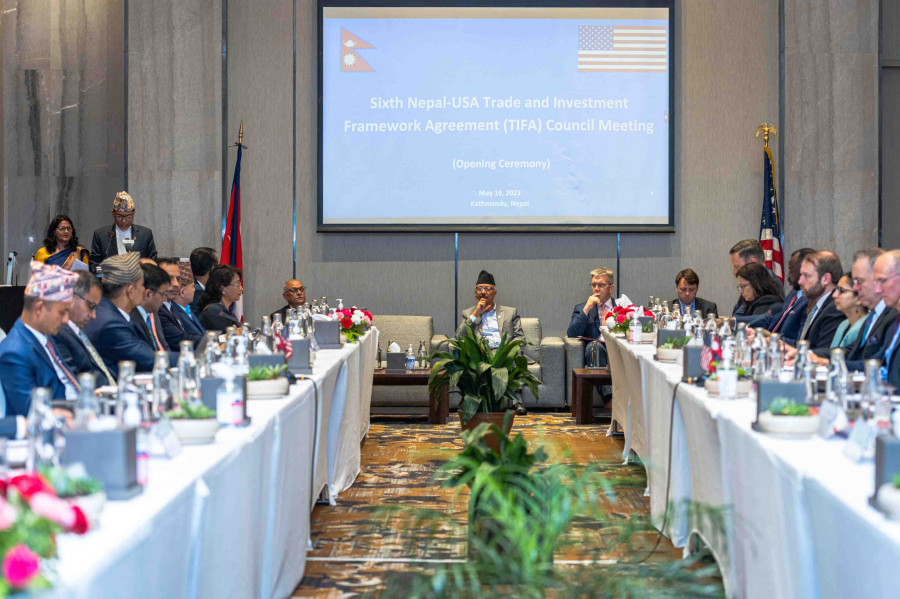Money
Nepal asks US for continued privileges after graduation
Nepal will lose the trade preferences it has been receiving after it graduates to developing country in 2026.
Krishana Prasain
Nepal on Friday urged the United States to continue providing trade privileges as a least developed country (LDC) for a few years more even after it graduates to developing country in 2026.
The Himalayan republic is scheduled to move up from its status as an LDC which it has held since 1971. Graduation means the country will lose the trade preferences it has been receiving.
Speaking at the sixth meeting of the US-Nepal Trade and Investment Framework Agreement (TIFA) Council in Kathmandu, Industry Minister Ramesh Rijal asked for continued US support.
He has sought assistance especially in the continuation of LDC-specific trade preferences such as duty-free quota-free (DFQF) market access, flexible rules of origin, and LDC-specific technical assistance for a few more years after graduation.
The two countries discussed policies impacting the investment climate, intellectual property, digital economy, agriculture trade, market access and technical barriers to trade, including issues of the World Trade Organisation and Nepal’s graduation.
“As Nepal is set to graduate, our engagement through TIFA is critical and important,” said Madhu Kumar Marasini, secretary of the Ministry of Industry, Commerce and Supply.
“We hope US development cooperation will be scaled up in the future given Nepal’s need for resources while graduating. We have some key export items with comparative advantage that still remain outside the US preference basket. We would like to request the US to consider these products,” he said.
The US is Nepal’s sixth largest trading partner after India, China, Indonesia, the United Arab Emirates and Argentina.
Nepal exported goods worth Rs17.99 billion to the US while imports stood at Rs50 billion in the last fiscal year. The trade deficit with the US amounted to Rs32 billion.
Minister Rijal said that Nepal had been suffering a trade deficit with the US for the last five years. He said Nepal failed to utilize the preferential treatment offered by the US.
The duty-free programme, specially designed for Nepal, came into effect on December 15, 2016, following the introduction of the US Trade Facilitation and Trade Enforcement Act by former US President Barack Obama.
The act was introduced to support Nepal’s economic recovery in the aftermath of the devastating 2015 earthquakes. Under the programme, Nepali products covered by 77 Harmonised Tariff Schedule are granted duty-free entry into the US till December 31, 2025.
“As small and medium-sized enterprises in Nepal make a limited range of products, there is a need to enhance their capacity,” Rijal added.
“The US-Nepal bilateral trade relationship has been growing in recent years. Trade between Nepal and the US totalled $391 million in 2022, up 28 percent,” Brendan Lynch, acting assistant of the US Trade Representative for South and Central Asia, told the meeting.
“The US will be investing nearly $1.50 billion in Nepal in the next five years through the USAID, Millennium Challenge Corporation (MCC), the Development Finance Corporation and other partnership schemes that we have,” said Dean R Thompson, US ambassador to Nepal. “This is a clear sign of the importance that the US has accorded.”
Thompson said, “We want to see more American companies, investors and more high-quality American goods and services available in Nepal. To attract investors, it requires a supportive and stable business investment climate.”
Following the rise in the export of hard cheese (dog chew) in considerable amounts to the US for the last few years, Nepal has asked the US to help it strengthen the dog chew manufacturing process and develop good manufacturing practice (GMP) guides.
Nepal also requested the US to facilitate the export of Nepali ginger, cardamom and tea. It asked the US to provide technical assistance to make the production process meet US sanitary requirements by installing laboratories as per US standards.
The meeting also discussed technical assistance to establish an effluent treatment plant for Nepali carpet factories to minimise environmental pollution.
Discussions were held for technical support for the implementation of the Nepal Trade Integrated Strategy and the mobilisation of climate-related funds to enhance the climate change resilience capacity of Nepali industries.
The meeting also talked about policies impacting the investment climate besides good regulatory practices to improve policy predictability.
The Foreign Investment and Technology Transfer Act (FITTA) relates to limits on foreign control in certain sectors, profit repatriation process and minimum threshold requirement for foreign investment.
The meeting also discussed the domestic payment system, retail branch operations for foreign banks and foreign portfolio investment in Nepal.
Encouraging US foreign direct investment including value chain investment in Nepal and technical assistance for developing public-private partnership (PPP) project pipelines figured in the discussions.
The meeting also dealt with agriculture trade, including an import ban on energy drinks, dried distillers grains with soluble (DDGS) and access to pork and poultry.
Similarly, delayed shipment of US-origin rice for the McGovern-Dole food for education school meals programme and agriculture innovation mission for climate featured in the agenda.
Discussions on market access and technical barriers included the topic of helping Nepali producers, especially small and medium entrepreneurs, to participate in US expos and fairs.




 8.22°C Kathmandu
8.22°C Kathmandu














